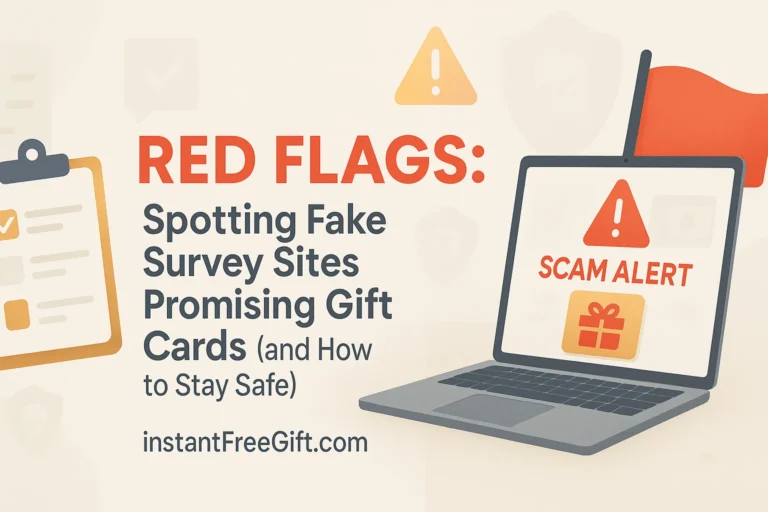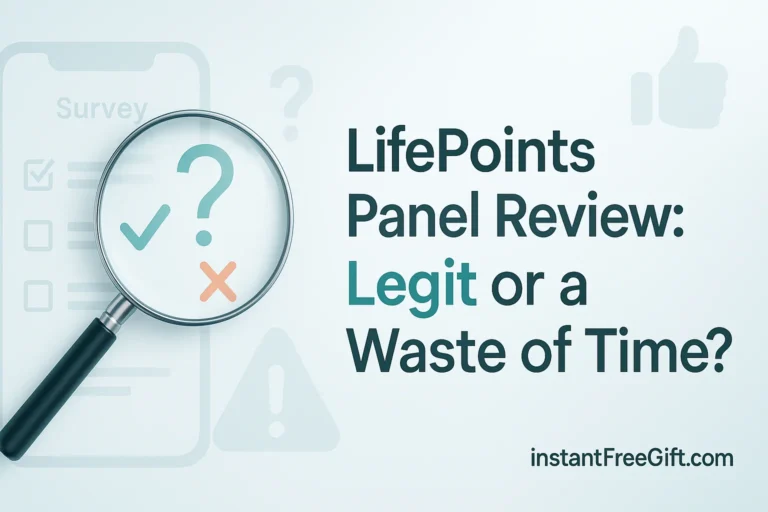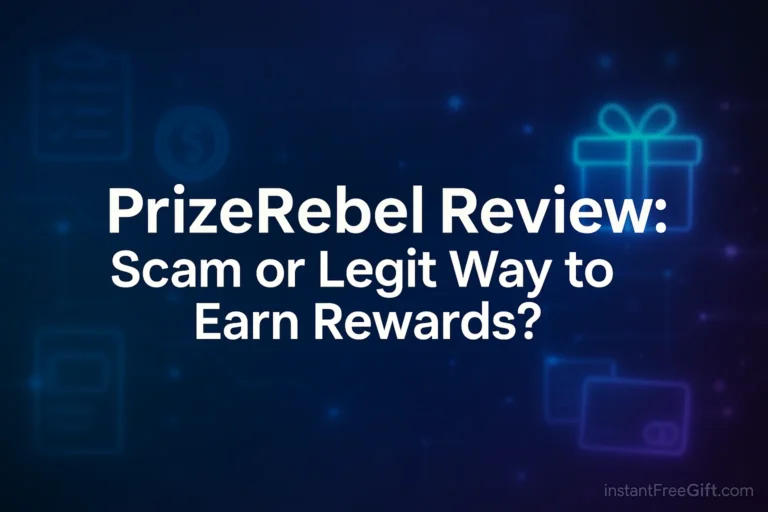Ultimate Guide to Gaming Safely Online: Protect Yourself from Scams
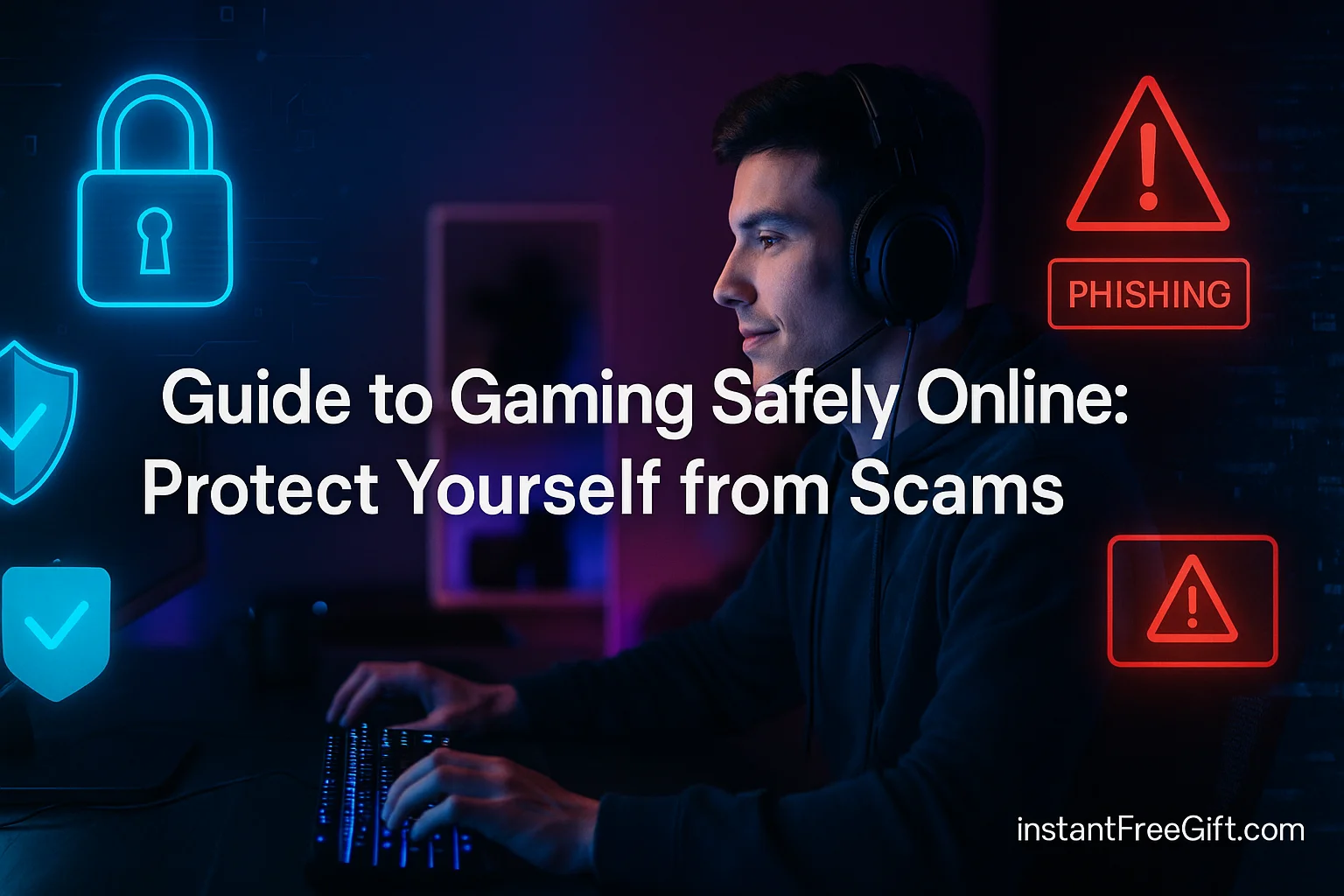
In today’s digital world, online gaming has evolved from a niche hobby to a global phenomenon embraced by millions. While gaming safely online should be a priority, many players focus solely on their next achievement or battle victory, overlooking critical security measures. The expanding universe of online games has unfortunately created fertile ground for scammers and cybercriminals looking to exploit unsuspecting gamers.
Whether you’re battling foes in massive multiplayer arenas, trading virtual items, or simply enjoying casual mobile games, understanding how to protect yourself online is essential. This comprehensive guide explores the common threats targeting gamers and provides actionable steps to ensure your gaming experience remains secure and enjoyable.
The Rising Threat Landscape for Online Gamers
The gaming industry has exploded in popularity, with global gaming market revenues exceeding $180 billion annually. This growth has attracted not just legitimate businesses but also malicious actors seeking to capitalize on the vast user base. According to recent cybersecurity reports, attacks targeting gamers increased by nearly 40% in the past year alone, with millions of dollars lost to various scams.
Gaming safely online means understanding that your valuable accounts, personal information, and even financial details could be at risk. Let’s examine the most common threats and learn how to defend against them.
Common Scams Targeting Gamers
Phishing Scams: The Digital Bait and Switch
Phishing remains one of the most prevalent methods used to target gaming communities. These scams typically involve:
- Fake login pages: Counterfeit websites mimicking PlayStation Network, Steam, Xbox Live, or other gaming platforms, designed to steal your credentials
- Deceptive emails: Messages claiming to be from game developers or platforms warning about “account issues” that require immediate attention
- Chat-based phishing: Direct messages on gaming platforms or Discord offering too-good-to-be-true deals or requesting account verification
“I received what looked like an official email from Steam saying my account had suspicious activity. After clicking the link and entering my details, I lost access to my account with over $2,000 worth of games. Always verify the sender and URL before entering any information.”
– Mark, 26, Recovered phishing victim
Fake Gift Card Generators: The Ultimate Empty Promise
One particularly insidious scam targets gamers looking to save money on game purchases. Fake gift card generators claim to provide free codes for platforms like PlayStation Network, Xbox, or Steam. In reality, these tools:
- Install malware or ransomware on your device
- Steal personal information entered during the “verification process”
- Lead users through endless surveys that collect personal data but never deliver the promised codes
Account Hacking: Losing Your Digital Identity
Gaming accounts often represent significant investments of time and money. Hackers target these accounts to:
- Steal and sell valuable in-game items or currency
- Access linked payment information
- Abuse your reputation in gaming communities
- Use your account for further scams targeting your friends
Account hacking methods include credential stuffing (using leaked passwords from other sites), keyloggers, and social engineering techniques.
In-Game Scams: Virtual Worlds, Real Losses
Many scams occur entirely within games, particularly those with trading systems or economies:
- Trade scams: Offering to trade rare items but switching them at the last second
- Middleman scams: Claiming to be a trusted third party for high-value trades, then disappearing with both players’ items
- Duplication tricks: Promising to duplicate valuable items through a “glitch” but simply stealing the original
- Boosting services: Taking payment to improve accounts but either never delivering or using cheats that get accounts banned
“Free” Item or Service Scams
The promise of something for nothing remains one of the most effective lures:
- Fake giveaways requiring “verification” through suspicious links
- “Free V-Bucks” or other currency generators
- Beta test invitations for unreleased games that install malware
- Free cheat tools or mods that contain trojans or keyloggers
How to Protect Yourself While Gaming Online
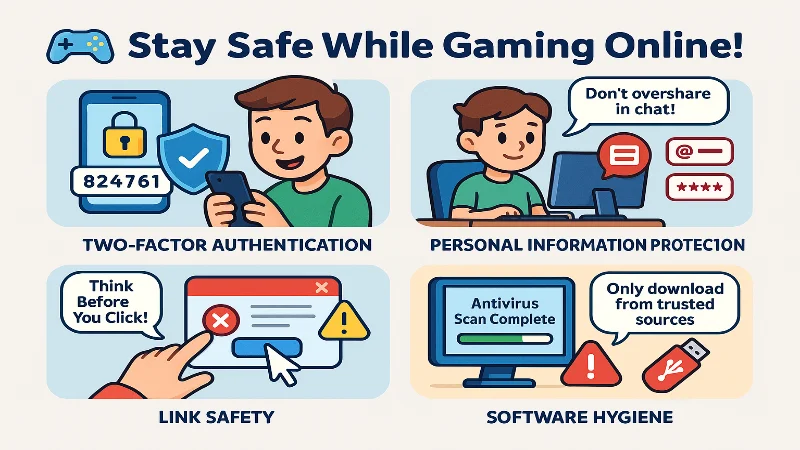
Strong Password Practices: Your First Line of Defense
When gaming safely online, proper password management is critical:
- Create unique passwords for each gaming platform and never reuse passwords from other sites
- Use complex combinations of uppercase and lowercase letters, numbers, and symbols
- Consider password length over complexity—longer passphrases are often more secure and easier to remember
- Use a password manager like LastPass, 1Password, or Bitwarden to generate and store strong passwords
- Change passwords regularly, especially after news of data breaches
Two-Factor Authentication: An Essential Security Layer
Two-factor authentication (2FA) adds a crucial second verification step when logging into accounts:
| Platform | 2FA Options | How to Enable |
|---|---|---|
| PlayStation Network | SMS, Authentication App | Account Settings → Security → 2-Step Verification |
| Xbox Live | Email, Authentication App, Phone | Account.microsoft.com → Security → Two-step verification |
| Steam | Steam Guard (Mobile App) | Steam Client → Settings → Account → Steam Guard |
| Epic Games | Email, Authentication App | Account Settings → Password & Security |
| Nintendo | Authentication App | Nintendo Account → Sign-in and security settings |
Enabling 2FA can reduce account compromise risk by over 99%, according to security experts.
Personal Information Protection: Think Before You Share
Gaming safely online means being mindful about what information you reveal:
- Limit personal details in your public profile and username
- Be wary of questions about your location, age, school, or other identifying information
- Never share account recovery information like the answers to security questions
- Use privacy settings to control who can view your profile or send you messages
- Consider creating a separate email address exclusively for gaming accounts
Link Safety: Think Before You Click
Malicious links are a primary vector for security compromises:
- Hover over links to preview the destination URL before clicking
- Be suspicious of shortened URLs (bit.ly, tinyurl, etc.) that hide the true destination
- Verify directly with official sources rather than clicking links in emails or messages
- Never download “required” software from unofficial sources
- Use browser extensions like Web of Trust that highlight potentially dangerous sites
Software Hygiene: Stay Updated, Stay Protected
Regular maintenance significantly reduces vulnerability:
- Keep your operating system updated with the latest security patches
- Update games and gaming clients promptly when new versions are released
- Use automatic updates where available to ensure you’re always protected
- Regularly audit and uninstall unused games and applications that might contain vulnerabilities
Protecting Your Gaming Accounts
PlayStation Network Security
Sony’s PlayStation Network has strengthened its security following high-profile breaches:
- Enable 2FA through the PSN account management page
- Set up spending limits to prevent unauthorized purchases
- Review login history regularly for unfamiliar access
- Use the PlayStation app for secure code verification rather than SMS where possible
For an in-depth guide to securing your PlayStation account, check out our detailed PSN Security article.
Xbox Live Security
Microsoft provides robust security options for Xbox users:
- Use the Microsoft Authenticator app for 2FA
- Review connected apps and services regularly
- Set up a passkey for a more convenient secure login on your home console
- Enable family settings for additional protection if sharing the console
Steam Security
Valve’s platform has been a frequent target for scammers due to its valuable digital inventories:
- Enable Steam Guard through the mobile app rather than email
- Be extremely cautious with inventory trades, especially with unknown users
- Verify marketplace transactions carefully before confirming
- Consider making your inventory private to prevent targeted scams
Other Platform Security
For other gaming platforms, follow these general principles:
- Mobile games: Only download from official app stores and review permissions carefully
- Epic Games Store: Enable email verification and 2FA through settings
- Battle.net: Use the Blizzard Authenticator app and set up SMS Protect
- Nintendo: Create a strong PIN for eShop purchases in addition to account security
Protecting Your Gaming Devices
Antivirus Protection: Essential Gaming Gear
Contrary to popular belief, gaming PCs need security software:
- Choose gaming-optimized antivirus solutions that won’t impact performance
- Run regular system scans, especially after downloading new content
- Consider options like Bitdefender, Kaspersky, or Norton, which offer gamer modes
- Don’t disable protection temporarily for “better performance”—the risk isn’t worth it
Firewall Configuration: Your Digital Bouncer
A properly configured firewall helps control what connects to your gaming setup:
- Use both hardware (router) and software firewalls
- Create rules to allow legitimate gaming traffic
- Learn how to temporarily enable access for new games without disabling the entire firewall
- Regularly review connected applications and their permissions
VPN Usage: Privacy While You Play
Virtual Private Networks offer several benefits for gamers:
- Protection when using public Wi-Fi for mobile gaming
- Defense against DDoS attacks in competitive gaming
- Access to games with regional restrictions (though check terms of service)
- Reduced risk of IP-based targeting or swatting
Popular gaming-friendly VPN options include NordVPN, ExpressVPN, and CyberGhost, which offer optimized servers for lower latency.
Being a Responsible Gamer
Reporting Harmful Behavior
Gaming safely online involves community responsibility:
- Familiarize yourself with each platform’s reporting tools
- Document harassment, threats, or scam attempts
- Report suspicious activity even if you weren’t personally affected
- Follow up on reports if necessary
Respectful Gaming Practices
Creating a safer gaming environment benefits everyone:
- Treat others with respect regardless of skill level or background
- Avoid sharing or requesting personal information
- Be mindful of younger players who may be more vulnerable
- Remember that competitive spirit doesn’t justify toxic behavior
Age Ratings and Content Awareness
Particularly important for families:
- Understand and respect game age ratings (ESRB, PEGI)
- Use parental controls on consoles and platforms
- Discuss appropriate online behavior with younger gamers
- Monitor in-game purchases and social interactions
Conclusion: Staying One Move Ahead
Gaming safely online doesn’t require advanced technical knowledge—just awareness and consistent habits. The threats targeting gamers continue to evolve, but by following the practices outlined in this guide, you can significantly reduce your risk while enjoying your favorite games.
Remember that security isn’t a one-time setup but an ongoing process. Regularly review your account settings, update your security measures, and stay informed about new threats targeting gaming communities.
By protecting yourself, you’re also helping to create a more secure environment for all gamers. Report suspicious activity, share legitimate security information with friends, and promote responsible gaming practices within your communities.
The ultimate goal is to focus on what matters most—enjoying incredible gaming experiences without worry or interruption. With these security practices in place, you can concentrate on conquering new challenges, exploring vast worlds, and connecting with fellow players, confident that you’ve taken the necessary steps to protect yourself online.
Looking for legitimate ways to enhance your gaming experience without risking security? Check out our guide to How to Earn Steam Gift Cards for safe methods to earn gaming rewards.
For more detailed information on specific platform security, see our comprehensive guides to Password Security Best Practices and Choosing the Right Antivirus for Gamers.

